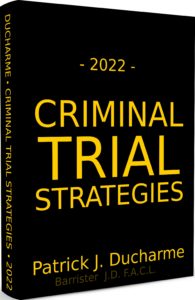At the beginning of a trial a Judge usually orders all prospective witnesses excluded from the courtroom until each witness is called to testify in the order chosen by the prosecutor or counsel. If the presiding Judge fails to order the exclusion of witnesses prior to their testimony, counsel will usually ask the Judge to make such an order. Along with the order excluding witnesses from the courtroom until they testify, the court usually directs the witnesses prior to their exclusion not to communicate with other prospective witnesses while waiting to provide their evidence. While these directions are discretionary, trial judges invariably follow this procedure. The procedure seeks to ensure that a witness is not influenced by the evidence or information of another witness.
There may be some exceptions to this usual procedure. Two notable exceptions are:
1. It may be necessary for an expert who will testify later in the trial to hear certain evidence that is necessary to establish or confirm an opinion that they will provide later in their testimony. This may also include the evidence of another expert called on behalf of the opposing side. In these circumstances counsel requests the court’s permission to allow an intended expert witness to remain in the courtroom, as an exception to the court’s order excluding all witnesses, in order to permit the intended expert to hear the evidence of the expert called by the opposing side.
2. This method obviates the necessity of counsel having to ask her expert to provide an opinion by posing hypothetical questions based accurately on the evidence previously given by another expert on the same topic of expertise.
3. Remaining in the courtroom permits the second or subsequent expert to listen and take notes during the testimony of the earlier expert, and to respond directly to the evidence of the opposing expert when he or she testifies.
4. Often a prosecutor will ask that an instructing police officer be allowed to remain in the courtroom while the prosecutor’s evidence is called so as to provide assistance to the prosecutor in the presentation of the prosecutor’s case. An exception to the usual exclusion order does not generally prohibit that instructing officer from also giving evidence later in the trial. Usually the trial Judge will call upon defence counsel to state whether the defence has any objection to the officer remaining to assist the prosecutor. Defence counsel might object to the request for this exception on the basis that remaining in the courtroom during other evidence may provide an unfair advantage to the prosecution.
If counsel becomes aware of a breach of the trial Judge’s exclusion order with admonition not to discuss matters with other witnesses outside the courtroom, a breach of this direction by the trial Judge does not necessarily render the evidence of the witness who so breaches inadmissible. A breach of an exclusion order or the direction for witnesses excluded not to discuss the evidence prior to their testimony generally has been determined to go to the weight of that witness’s testimony not its admissibility.
If, for example, one of the witnesses fails to abide by the order, or, mistakenly does not realize that the order applies to him and remains in the courtroom contrary to the order or directions of the trial Judge, the court may still hear that witness’s testimony, however, the court may consider the fact that the witness remained in the courtroom improperly in assessing the weight to be attributed to that witness’s evidence.
The above is the an excerpt of Patrick J Ducharme’s book, Criminal Trial Strategies, available at Amazon or in bulk through MedicaLegal Publishing.
Read or listen to the Preface and Introduction and subscribe to Patrick Ducharme’s Youtube Channel.

